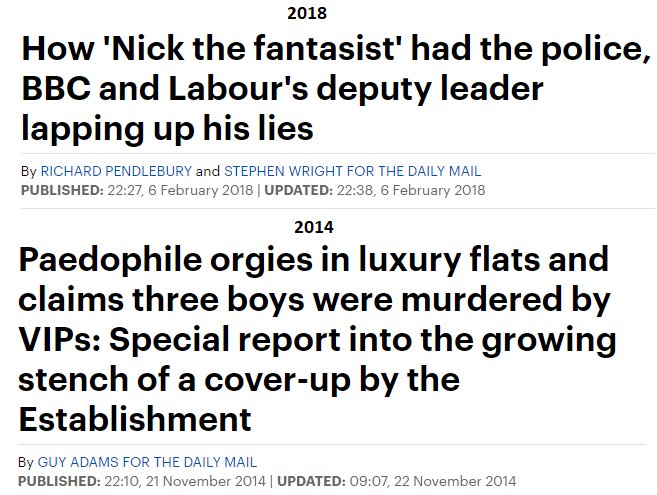From Mark Watts, formerly of Exaro News:
I can confirm, as @ciabaudo disclosed, that Bar Standards Board issued Barbara Hewson with “administrative warning” last July over her “Twitter activity”… #barbietroll
— Mark Watts (@MarkWatts_1) February 27, 2018
Several years ago, Watts was promising that very soon the police would confirm allegations of “Westminster VIP child sex abuse and murder” that would rock the country to its foundations; then, as police and journalistic investigations undercut the sensational narratives he had been instrumental in promoting, he lowered his expectations and instead offered the more modest promise that various sceptics would soon be put on trial for harassment offences and, like “green bottles“, would “fall”.
That didn’t come to pass either, so he now settles on the important information that the Bar Standards Board has asked the barrister Barbara Hewson not to be rude to people on Twitter, even though she has been on receiving end of a great deal of it herself – particularly, although not exclusively, from self-styled “child sex abuse activists” who promote lurid conspiracy theories about figures in public life, and who regard Barbara’s scathing scepticism with self-righteous anger.
Watts’s Tweet drew a hostile reaction from David Aaronovitch:
How dare you? How dare you cite that anti-Semitic creep in your campaign against Barbara Hewson who was as right about all this as you were disastrously wrong? Have you no shame Watts?
— David Aaronovitch (@DAaronovitch) February 27, 2018
The “anti-Semitic creep” here is @ciabaudo, who is known variously as Alun Roberts and Alan Goodwin – the latter is his legal name. Goodwin, who lives in Germany, makes wide-ranging allegations of organised and secret “elite” paedophile rings in British society, often seeing tenuous links between people in public life as damning evidence of secret collusion in the foulest of crimes. The supposed involvement of Jews in this activity seems to be of particular interest to him, and he approving promotes anti-Semitic sources.
In reply to David’s Tweet, Watts asked to see “evidence” of @ciabaudo’s anti-Semitism – I then put forward one instance, and others provided further examples. (1) Here is an outline:
23 April 2013: Goodwin posts a link that he says “didn’t attract the attention it deserves”. The link clicks through to a far-right website called Cigpapers; the specific page has since been deleted, but the url indicates that it used to carry an essay called “Tony Blair’s Islington People”. This remains available elsewhere on social media, and it refers to various politicians as “multiculturalist Jews”. In reply to someone who says “it truly makes the blood run cold”, Goodwin explains that “I live in Germany and my dad freed Bergen-Belsen, but there sure seems to be a lot of nepotist Jews here.”
3 August 2014: Goodwin replies to Tweet by one Ian Millard that stated “Jewess on BBC Radio 4 Sunday saying “”British” Jews feel a real sense of patriotism”..TO ISRAEL! […] #HitlerWasRight”. Goodwin’s reaction is to ask “I wonder where the allegiances of the Jews on the Privy Council lie?”, although he then covers himself by adding that “I strongly disagree with Hitler being right though”.
25 September 2014: Goodwin replies to Tweet by the journalist Meirion Jones asking whether The Times might run “similar stories about senior politicians” after the publication of an article about Greville Janner; Goodwin’s suggestion is that “They could run a series about leading Jews … Janner, Brittan and Mandelson”.
9 December 2014: Returning to his Privy Council theme, Goodwin asks Hugo Rifkind, son of the politician Malcolm Rifkind, “How can someone who serves a foreign power sit on the Queen’s privy council?” Goodwin then tells him that “I’m sure your whole family would be pulled in all directions as far as their allegiances go.”
18 April 2015: Goodwin gives a “Like” to a Tweet by someone asserting that “Leon Brittan / Greville Janner Both JEWS[…] Both PEDOPHILES”.
21 April 2015: Goodwin refers to an article about Greville Janner published by the Occidental Observer (tagline:”White Identity, Interests, and Culture”) which refers to “the moneyspinning Holocaust Educational Trust”. He says he’s “looking forward to Part 2”, adding that “Even if @Dannythefink comes down on me like a tonne of bricks, I really do think the Jewish cabal aspect should be investigated”.
7 July 2015: Goodwin posts a screencapture, with the added commentary “Part of the problem 1”. The screencapture appears to be derived from the “Tony Blair’s Islington People” essay, and it focuses on Peter Mandelson as “a Bilderberger homosexual multiculturalist Jew”, who has been “Denounced by Tam Dalyell MP as being part of Blair’s ‘Jewish Cabal'”.
Watts’s reaction to this kind of thing – after being pressed for comment – was as follows:
I have been tagged into comments that I would not myself have made. I do not agree with everything anyone mentioned by me has said. But I also think that your claim was exaggerated.
— Mark Watts (@MarkWatts_1) February 27, 2018
Goodwin’s own explanation is that there is no difference between the way he comments about Jews and how one might comment about Methodists; that he is more interested in what a source is “saying” than whether or not it is anti-Semitic; and that it is a “problem” to refer to things he has merely quoted approvingly rather than said in his own words.
Perhaps that is sufficient for Watts, but most of us can see the obvious bad faith from a mile off.
Footnote
1. The evidence Watts asked for was provided mostly by Hugo Rifkind, Zetetic Elench, and Frankie.
Filed under: Uncategorized | 75 Comments »



